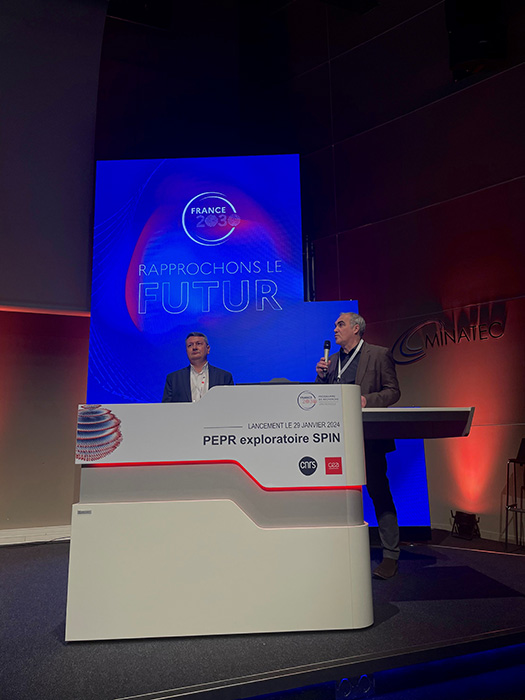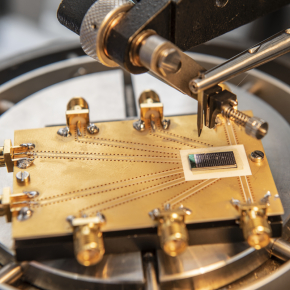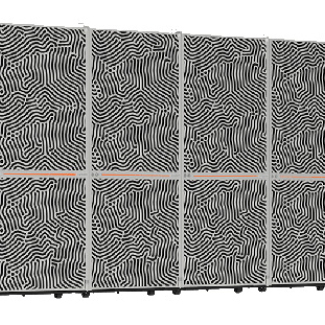
France 2030: The CEA and CNRS are leading a national spintronics programme for frugal, agile, and sustainable digital technology
The SPIN national research programme officially launched in Grenoble on 29 January 2024. With a budget of 38.13 million euros over eight years, this ambitious programme focuses on spintronics innovation for frugal, agile, and sustainable digital technology. Led by the CEA and CNRS in accordance with a national strategic vision, it will be based on a broad ecosystem of academic and industrial partners, and will also promote European synergies. The programme will contribute to the competitiveness and sovereignty of Europe in the new technologies related to the digital transition.
The growth of the digital world has an environmental cost that can no longer be ignored. Forecasts show that by 2030 it will be responsible for 20-30% of global electricity consumption. The change of paradigm that is needed should make the energy frugality of future electronic devices a key performance criterion on the same level as computing power, speed, miniaturisation, and cost.
As a genuine conceptual breakthrough, spintronics provides disruptive solutions that address this major problem for digital technology of the future. It offers enhanced functionalities in comparison to traditional electronics, namely by exploiting both electron spin and charge, combined with low energy consumption thanks to the non-volatile nature of magnetism. Despite still being considered an emerging field, spintronics has already revolutionised data storage and sensor technology in recent decades. Today it offers multiple pathways for developing new components intended for devices that are energy efficient, reconfigurable, and integrable. For instance, hybrid spintronics/CMOS systems are henceforth used in fields such as the Internet of Things (IoT), artificial intelligence (AI), cloud storage, and communication networks of the future.
To support these impactful prospects, the government decided to invest, as part of France 2030, 38.13 million euros over 8 years in the SPIN exploratory priority research programme and equipment (PEPR). Led by the CEA and CNRS in accordance with a national strategic vision, it will notably bring together the partner Universities of Grenoble-Alpes, Paris-Saclay, and Lorraine to structure and energise the French spintronics community, in addition to industrial actors and start-ups. Due to its high potential in numerous digital fields, the SPIN PEPR will closely collaborate with the Electronics PEPR launched in 2022, as well as with the Quantum Technology, Future Networks, Emerging Materials, and Artificial Intelligence PEPRs.
The results and developments expected in connection with the SPIN PEPR will be in keeping with the national strategy for digital components, systems, and infrastructure, as well as the new agency strategy announced by the French President last 7 December. On the European level, they could provide new opportunities in connection with the European Chip Act programme, which strives to achieve competitiveness and resilience in semiconductor technologies and applications.
The SPIN PEPR will support flagship collaborative projects and specific open calls for proposals; attract talent through funding for “Young Scientist” projects; expand training to prepare for the jobs of the future in spintronics and related technologies; and promote European synergies, notably in connection with the Spintronic Factory network launched in 2016 by two CEA and CNRS entities (Spintec and the Albert Fert Laboratory), with a view to consolidating the community and enhancing the industrial impact of spintronic applications within the European Union.
Five projects were already launched in November 2023:
- CHIREX: Going beyond CMOS with chiral textures
- TOAST: Towards spin-based THz technology
- SWING: Spin waves for advanced signal processing
- SPINCOM: Radiofrequency spintronics for smart communication solutions
- ADAGE: Next generation magnetic detection
Their implementation will be based on a network of high-end research infrastructure accessible to the entire community, which the SPIN PEPR will help bolster via three interdisciplinary projects:
- SPINMAT: Advanced spintronic materials
- SPINCHARAC: Advanced characterization equipment
- SPINTHEORY: Theory and multiscale modelling
“Thanks to the SPIN PEPR, the strong dynamics of spintronics will pave the way for entirely new prospects in the fields of computing, IoT, telecommunications, reprogrammable logic, and AI components, fields that are central to sovereignty in information technology, security, energy, and health, as well as for the defence, nuclear, and aerospace markets,” point out SPIN PEPR co-directors Lucian Prejbeanu and Vincent Cros, of the CEA and CNRS respectively.
To learn more visit https://pepr-spin.fr

© Margaux Monvoisin
|
The French government has allocated €3 billion from France 2030 investment plan for research through ambitious programmes (the PEPRs), led by research institutions to consolidate French leadership in key areas; linked or likely to be linked to technological, economic, societal, health or environmental transformation, and which are considered priorities at national or European level. The French National Research Agency (ANR) operates the PEPRs on behalf of the French government. |


